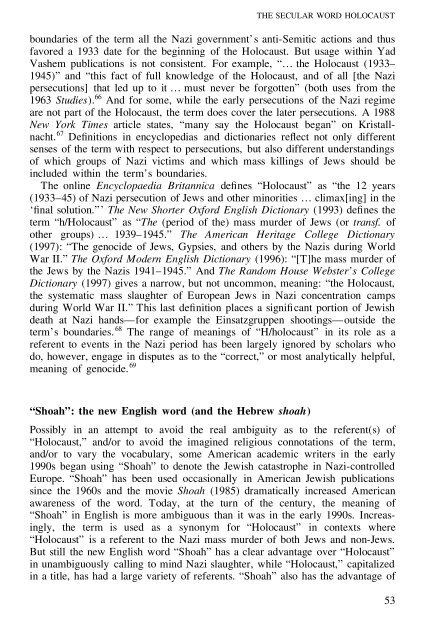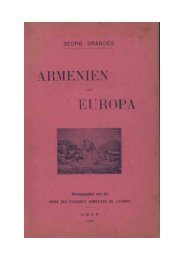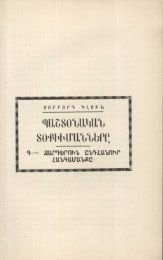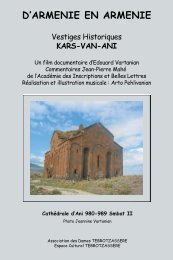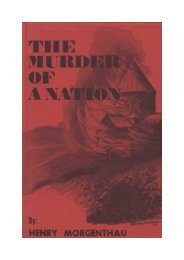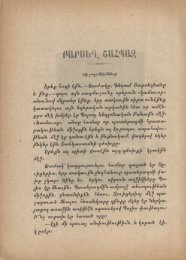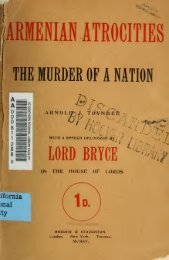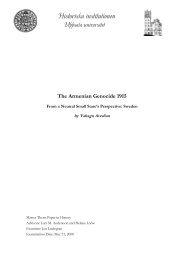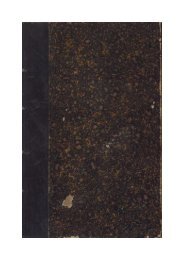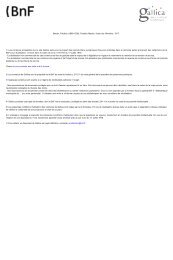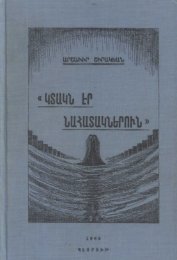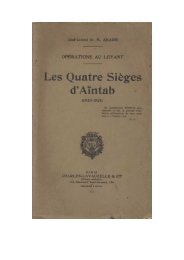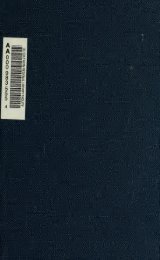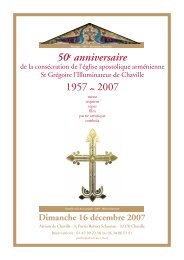The secular word HOLOCAUST: scholarly myths, history, and 20th ...
The secular word HOLOCAUST: scholarly myths, history, and 20th ...
The secular word HOLOCAUST: scholarly myths, history, and 20th ...
Create successful ePaper yourself
Turn your PDF publications into a flip-book with our unique Google optimized e-Paper software.
THE SECULAR WORD <strong>HOLOCAUST</strong>boundaries of the term all the Nazi government’s anti-Semitic actions <strong>and</strong> thusfavored a 1933 date for the beginning of the Holocaust. But usage within YadVashem publications is not consistent. For example, “… the Holocaust (1933–1945)” <strong>and</strong> “this fact of full knowledge of the Holocaust, <strong>and</strong> of all [the Nazipersecutions] that led up to it … must never be forgotten” (both uses from the1963 Studies). 66 And for some, while the early persecutions of the Nazi regimeare not part of the Holocaust, the term does cover the later persecutions. A 1988New York Times article states, “many say the Holocaust began” on Kristallnacht.67 De nitions in encyclopedias <strong>and</strong> dictionaries re ect not only differentsenses of the term with respect to persecutions, but also different underst<strong>and</strong>ingsof which groups of Nazi victims <strong>and</strong> which mass killings of Jews should beincluded within the term’s boundaries.<strong>The</strong> online Encyclopaedia Britannica de nes “Holocaust” as “the 12 years(1933–45) of Nazi persecution of Jews <strong>and</strong> other minorities … climax[ing] in the‘ nal solution.”’ <strong>The</strong> New Shorter Oxford English Dictionary (1993) de nes theterm “h/Holocaust” as “<strong>The</strong> (period of the) mass murder of Jews (or transf. ofother groups) … 1939–1945.” <strong>The</strong> American Heritage College Dictionary(1997): “<strong>The</strong> genocide of Jews, Gypsies, <strong>and</strong> others by the Nazis during WorldWar II.” <strong>The</strong> Oxford Modern English Dictionary (1996): “[T]he mass murder ofthe Jews by the Nazis 1941–1945.” And <strong>The</strong> R<strong>and</strong>om House Webster’s CollegeDictionary (1997) gives a narrow, but not uncommon, meaning: “the Holocaust,the systematic mass slaughter of European Jews in Nazi concentration campsduring World War II.” This last de nition places a signi cant portion of Jewishdeath at Nazi h<strong>and</strong>s—for example the Einsatzgruppen shootings—outside theterm’s boundaries. 68 <strong>The</strong> range of meanings of “H/holocaust” in its role as areferent to events in the Nazi period has been largely ignored by scholars whodo, however, engage in disputes as to the “correct,” or most analytically helpful,meaning of genocide. 69“Shoah”: the new English <strong>word</strong> (<strong>and</strong> the Hebrew shoah)Possibly in an attempt to avoid the real ambiguity as to the referent(s) of“Holocaust,” <strong>and</strong>/or to avoid the imagined religious connotations of the term,<strong>and</strong>/or to vary the vocabulary, some American academic writers in the early1990s began using “Shoah” to denote the Jewish catastrophe in Nazi-controlledEurope. “Shoah” has been used occasionally in American Jewish publicationssince the 1960s <strong>and</strong> the movie Shoah (1985) dramatically increased Americanawareness of the <strong>word</strong>. Today, at the turn of the century, the meaning of“Shoah” in English is more ambiguous than it was in the early 1990s. Increasingly,the term is used as a synonym for “Holocaust” in contexts where“Holocaust” is a referent to the Nazi mass murder of both Jews <strong>and</strong> non-Jews.But still the new English <strong>word</strong> “Shoah” has a clear advantage over “Holocaust”in unambiguously calling to mind Nazi slaughter, while “Holocaust,” capitalizedin a title, has had a large variety of referents. “Shoah” also has the advantage of53


